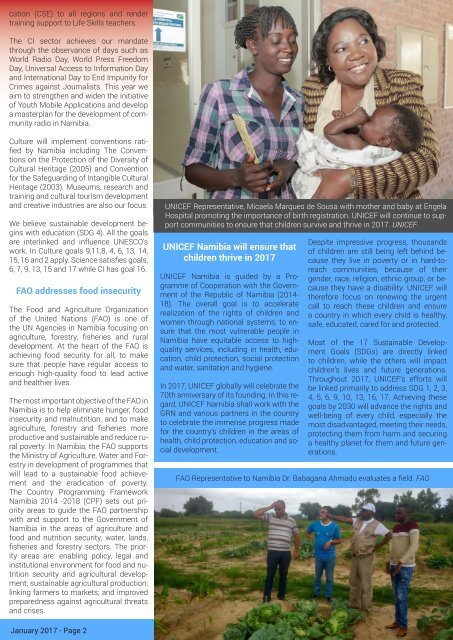UN Namibia
2ktDYIo
2ktDYIo
You also want an ePaper? Increase the reach of your titles
YUMPU automatically turns print PDFs into web optimized ePapers that Google loves.
cation (CSE) to all regions and render<br />
training support to Life Skills teachers.<br />
The CI sector achieves our mandate<br />
through the observance of days such as<br />
World Radio Day, World Press Freedom<br />
Day, Universal Access to Information Day<br />
and International Day to End Impunity for<br />
Crimes against Journalists. This year we<br />
aim to strengthen and widen the initiative<br />
of Youth Mobile Applications and develop<br />
a masterplan for the development of community<br />
radio in <strong>Namibia</strong>.<br />
Culture will implement conventions ratified<br />
by <strong>Namibia</strong> including The Conventions<br />
on the Protection of the Diversity of<br />
Cultural Heritage (2005) and Convention<br />
for the Safeguarding of Intangible Cultural<br />
Heritage (2003). Museums, research and<br />
training and cultural tourism development<br />
and creative industries are also our focus.<br />
We believe sustainable development begins<br />
with education (SDG 4). All the goals<br />
are interlinked and influence <strong>UN</strong>ESCO’s<br />
work. In Culture goals 9,11,8, 4, 6, 13, 14,<br />
15, 16 and 2 apply. Science satisfies goals,<br />
6, 7, 9, 13, 15 and 17 while CI has goal 16.<br />
FAO addresses food insecurity<br />
The Food and Agriculture Organization<br />
of the United Nations (FAO) is one of<br />
the <strong>UN</strong> Agencies in <strong>Namibia</strong> focusing on<br />
agriculture, forestry, fisheries and rural<br />
development. At the heart of the FAO is<br />
achieving food security for all, to make<br />
sure that people have regular access to<br />
enough high-quality food to lead active<br />
and healthier lives.<br />
The most important objective of the FAO in<br />
<strong>Namibia</strong> is to help eliminate hunger, food<br />
insecurity and malnutrition, and to make<br />
agriculture, forestry and fisheries more<br />
productive and sustainable and reduce rural<br />
poverty. In <strong>Namibia</strong>, the FAO supports<br />
the Ministry of Agriculture, Water and Forestry<br />
in development of programmes that<br />
will lead to a sustainable food achievement<br />
and the eradication of poverty.<br />
The Country Programming Framework<br />
<strong>Namibia</strong> 2014 -2018 (CPF) sets out priority<br />
areas to guide the FAO partnership<br />
with and support to the Government of<br />
<strong>Namibia</strong> in the areas of agriculture and<br />
food and nutrition security, water, lands,<br />
fisheries and forestry sectors. The priority<br />
areas are: enabling policy, legal and<br />
institutional environment for food and nutrition<br />
security and agricultural development;<br />
sustainable agricultural production;<br />
linking farmers to markets; and improved<br />
preparedness against agricultural threats<br />
and crises.<br />
<strong>UN</strong>ICEF Representative, Micaela Marques de Sousa with mother and baby at Engela<br />
Hospital promoting the importance of birth registration. <strong>UN</strong>ICEF will continue to support<br />
communities to ensure that children survive and thrive in 2017. <strong>UN</strong>ICEF<br />
<strong>UN</strong>ICEF <strong>Namibia</strong> will ensure that<br />
children thrive in 2017<br />
<strong>UN</strong>ICEF <strong>Namibia</strong> is guided by a Programme<br />
of Cooperation with the Government<br />
of the Republic of <strong>Namibia</strong> (2014-<br />
18). The overall goal is to accelerate<br />
realization of the rights of children and<br />
women through national systems, to ensure<br />
that the most vulnerable people in<br />
<strong>Namibia</strong> have equitable access to highquality<br />
services, including in health, education,<br />
child protection, social protection<br />
and water, sanitation and hygiene.<br />
In 2017, <strong>UN</strong>ICEF globally will celebrate the<br />
70th anniversary of its founding. In this regard,<br />
<strong>UN</strong>ICEF <strong>Namibia</strong> shall work with the<br />
GRN and various partners in the country<br />
to celebrate the immense progress made<br />
for the country’s children in the areas of<br />
health, child protection, education and social<br />
development.<br />
Despite impressive progress, thousands<br />
of children are still being left behind because<br />
they live in poverty or in hard-toreach<br />
communities, because of their<br />
gender, race, religion, ethnic group, or because<br />
they have a disability. <strong>UN</strong>ICEF will<br />
therefore focus on renewing the urgent<br />
call to reach these children and ensure<br />
a country in which every child is healthy,<br />
safe, educated, cared for and protected.<br />
Most of the 17 Sustainable Development<br />
Goals (SDGs) are directly linked<br />
to children, while the others will impact<br />
children’s lives and future generations.<br />
Throughout 2017, <strong>UN</strong>ICEF’s efforts will<br />
be linked primarily to address SDG 1, 2, 3,<br />
4, 5, 6, 9, 10, 13, 16, 17. Achieving these<br />
goals by 2030 will advance the rights and<br />
well-being of every child, especially the<br />
most disadvantaged, meeting their needs,<br />
protecting them from harm and securing<br />
a healthy planet for them and future generations.<br />
FAO Representative to <strong>Namibia</strong> Dr. Babagana Ahmadu evaluates a field. FAO<br />
January 2017 - Page 2


